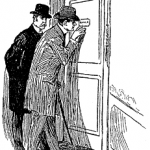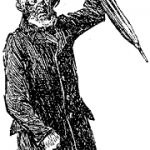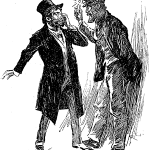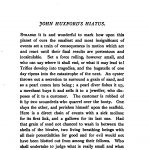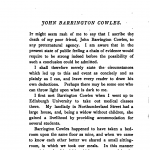He rose and stood with his back to the fire-place as his son entered. He was so tall that he towered above the younger man, but the latter’s square and compact frame made him, apart from the difference of age, the stronger man.
The young man had dropped the air of sarcasm which he found was most effective with the clerks, and had resumed his natural manner, which was harsh and brusque.
“What’s up!” he asked, dropping back into a chair, and jingling the loose coins in his trouser pockets.
“I have had news of the Black Eagle,” his father answered. “She is reported from Madeira.”
“Ah!” cried the junior partner eagerly. “What luck?”
“She is full, or nearly so, according to Captain Hamilton Miggs’ report.”
“I wonder Miggs was able to send a report at all, and I wonder still more that you should put any faith in it,” his son said impatiently. “The fellow is never sober.”
“Miggs is a good seaman, and popular on the coast. He may indulge at times, but we all have our failings. Here is the list as vouched for by our agent. ‘Six hundred barrels of palm oil’—”
“Oil is down to-day,” the other interrupted.
“It will rise before the Black Eagle arrives,” the merchant rejoined confidently. “Then he has palm nuts in bulk, gum, ebony, skins, cochineal, and ivory.”
The young man gave a whistle of satisfaction. “Not bad for old Miggs!” he said. “Ivory is at a fancy figure.”
“We are sorely in need of a few good voyages,” Girdlestone remarked, “for things have been very slack of late. There is one very sad piece of intelligence here which takes away the satisfaction which we might otherwise feel. Three of the crew have died of fever. He does not mention the names.”
“The devil!” said Ezra. “We know very well what that means. Three women, each with an armful of brats, besieging the office and clamouring for a pension. Why are seamen such improvident dogs?”
His father held up his white hand deprecatingly. “I wish,” he said, “that you would treat these subjects with more reverence. What could be sadder than that the bread-winner of a family should be cut off? It has grieved me more than I can tell.”
“Then you intend to pension the wives?” Ezra said, with a sly smile.
“By no means,” his father returned with decision. “Girdlestone and Co. are not an insurance office. The labourer is worthy of his hire, but when his work in this world is over, his family must fall back upon what has been saved by his industry and thrift. It would be a dangerous precedent for us to allow pensions to the wives of these sailors, for it would deprive the others of all motive for laying their money by, and would indirectly encourage vice and dissipation.”
Ezra laughed, and continued to rattle his silver and keys.
“It is not upon this matter that I desired to speak to you,” Girdlestone continued. “It has, however, always been my practice to prefer matters of business to private affairs, however pressing. John Harston is said to be dying, and he has sent a message to me saying that he wishes to see me. It is inconvenient for me to leave the office, but I feel that it is my Christian duty to obey such a summons. I wish you, therefore, to look after things until I return.”
“I can hardly believe that the news is true,” Ezra said, in astonishment. “There must be some mistake. Why, I spoke to him on ‘Change last Monday.”
“It is very sudden,” his father answered, taking his broad-brimmed hat from a peg. “There is no doubt about the fact, however. The doctor says that there is very little hope that he will survive until evening. It is a case of malignant typhoid.”
“You are very old friends?” Ezra remarked, looking thoughtfully at his father.
“I have known him since we were boys together,” the other replied, with a slight dry cough, which was the highest note of his limited emotional gamut. “Your mother, Ezra, died upon the very day that Harston’s wife gave birth to this daughter of his, seventeen years ago. Mrs. Harston only survived a few days. I have heard him say that, perhaps, we should also go together. We are in the hands of a higher Power, however, and it seems that one shall be taken and another left.”
“How will the money go if the doctors are right?” Ezra asked keenly.
“Every penny to the girl. She will be an heiress. There are no other relations that I know of, except the Dimsdales, and they have a fair fortune of their own. But I must go.”
“By the way, malignant typhoid is very catching, is it not?”
“So they say,” the merchant said quietly, and strode off through the counting-house.
Ezra Girdlestone remained behind, stretching his legs In front of the empty grate. “The governor is a hard nail,” he soliloquized, as he stared down at the shining steel bars. “Depend upon it, though, he feels this more than he shows. Why, it’s the only friend he ever had in the world—or ever will have, in all probability. However, it’s no business of mine,” with which comforting reflection he began to whistle as he turned over the pages of the private day-book of the firm.

